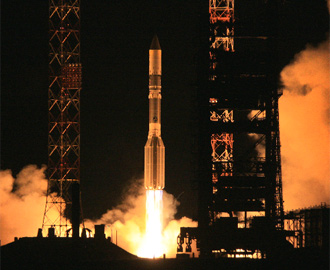
Abu Dhabi, April 25: Abu Dhabi’s second communications satellite was sent successfully into the orbit early morning on Tuesday, from a space station in Kazakhstan.
A Mubadala Development Company unit, Al Yah Satellite Communications Company or Yahsat, confirmed that the launch of Y1B took place at the Baikonur Cosmodrome, Kazakhstan at 2.18am, Abu Dhabi time.
Yahsat’s first satellite Y1A was successfully launched in April 2011.
The space vehicle will provide a range of broadband telecommunications and satellite services to the Middle East and Africa. It will also provide connectivity to remote areas across the region.
The Y1B weighs more than 6,000kg and features a spacecraft power of 14kW and has a 15-year design lifetime.
The space craft is equipped with a commercial multi-beam Ka-band payload, which will be used to provide a variety of government and commercial applications, including ‘YahClick’, a new reliable and affordable satellite broadband service for the MENA and South West Asia.
Jassem Mohamed Al Zaabi, Mubadala ICT Director said: ‘The successful launch of Y1B satellite reaffirms Abu Dhabi’s commitment to developing the ICT sector across the region.’
Tareq Abdul Raheem Al Hosani, Yahsat Chief Executive Officer was happy on achieving the milestone.
‘With the satellite in orbit, we are on track in our mission to connect communities around the region with reliable, affordable broadband services with our ‘YahClick’ service.’
Communications, he said was ‘a vital factor for economic and social growth in today’s world and we are very excited to be bringing this pioneering vision into reality.’
Satellite connectivity has the advantage of providing high bandwidth and easily accessible broadband services to these markets, with minimal time required to set up communications, the firm said in a statement.
Yahsat has established partnerships across 28 countries within the region, selecting reputable communications companies that understand the needs and conditions of each local market.
The partners have been carefully selected to ensure that the ‘YahClick’ service will be reliably and effectively marketed, installed and supported for customers.
Yahsat is working closely with key telecommunications providers to ensure comprehensive availability of the ‘YahClick’ service to homes, schools and businesses throughout the region.
Abu Dhabi-based Yahsat provides multipurpose satellite solutions for the government as well as commercial use for broadband, broadcast, military and communications use across the Middle East, Africa and South West Asia.
It is the first company in the Middle East and Africa to offer multi-purpose satellite services including satellite connectivity service, end-to-end satellite solutions and solutions for telecommunication carriers.





Comments
Add new comment